|

   
Screenplay by Ian McKellen and Richard Loncraine
| SCENE
40
INT. STAIRWELL - THE TOWER - NIGHT
BRACKENBURY looks down the steep open
stairwell. His voice echoes as he calls down to the intruding
TYRELL and NCO.
BRACKENBURY
What would you, fellow? And how came
you hither?
TYRELL
I would speak with Clarence; and I came
hither on my legs.
TYRELL insolently holds out CLARENCE'S
death-warrant to BRACKENBURY, who reluctantly starts down the
stairs to read it. |
scene 40. The discussion of
Clarence's imprisonment is interrupted to show his murderers
arriving at The Tower. In the play, Richard does not hand over the
death warrant until after dinner. The long scene which follows
(1.4) begins with Clarence's dream and continues right up to his
death. |
| SCENE
41
INT. PRIVATE DINING-ROOM - THE PALACE -
NIGHT
The stately HEAD BUTLER and full MALE AND
FEMALE STAFF are expertly serving soup and wine. Slurping and
breaking of bread. RICHARD manages, as usual, with just one hand.
QUEEN ELIZABETH
(breaking the long silence)
I never did incense His Majesty
Against your brother Clarence.
RICHARD
You may deny that you -
RIVERS
She may, my Lord -
RICHARD
She may. Earl Rivers! Why who knows not
so?
She may do more, sir, than denying that.
She may help you to many great promotions.
What may she not?
RIVERS
My Lord of Gloucester, I have too long
borne
Your blunt upbraidings and your bitter scoffs.
QUEEN ELIZABETH
I had rather be a country
serving-maid,
Than a great Queen in this condition
To be so baited, scorned and stormed at.
By heaven, I will acquaint His Majesty.
|
scene 41. Much of the food for
this scene was prepared to one side of the Prince Regent's
kitchens, where so many royal banquets were cooked and served.
Film food is rarely as appetising as it looks on the screen. Our
half-lobsters, dressed out of their shells, along with the fresh
fruit and salads, all started to decay over the 48 hours we were
in the Pavilion. Hour by hour, under the hot lamps, the mayonnaise
curdled, the bread curled and rotting fish began to stink. Only
the 'wine' (diluted Ribena) was replenished for each take and
therefore safe to swallow. |
RICHARD
Tell him and spare not. Look, what I
have said,
I will avouch in presence of the King.
Before you were Queen, yes, or your husband King,
I was a packhorse in his great affairs.
In all that time, you and your brother here
Were sympathetic to the enemy.
Let me put in your minds, if you forget,
What you have been before and what you are.
Indeed what I have been and what I am.
QUEEN ELIZABETH
(to herself)
A bottled spider.
(sweetly)
My dear brother-in-law, in those busy
days
When now you try to prove us enemies,
We followed then Edward, our lawful King.
RIVERS
So should she you, if you should be her
King.
RICHARD
If I should be? I'd rather be a pedlar.
I am too childish-foolish for this world.
QUEEN ELIZABETH
(exploding)
You poisonous, bunch-backed toad!
The company has listened to this bitter
exchange and been impressed by RICHARD'S cool righteousness.
Certainly QUEEN ELIZABETH has now gone too far.
BUCKINGHAM
(leans in to QUEEN ELIZABETH)
Have done! Have done.
QUEEN ELIZABETH
(crying now, to RIVERS)
Small joy have I in being this
country's Queen.
(sotto voce)
Oh, Buckingham, take heed of yonder
dog! Look, when he fawns, he bites.
CATESBY enters discreetly. All turn to the
King's private secretary.
CATESBY
(bowing)
Your Majesty, His Majesty has called
for you.
QUEEN ELIZABETH rises and takes PRINCESS
ELIZABETH out with her. RIVERS follows her swiftly. CATESBY
wonders what he has interrupted but also withdraws.
The guests who have risen and bowed are
not sure what they should do next. Pity to waste a free banquet.
RICHARD is relaxed.
RICHARD
What did she say, my Lord of
Buckingham?
|
'Were sympathetic to the enemy.'
This is my clarification of the play's 'Were factious to the house
of Lancaster.'
'What you have been before and what you are. Indeed what I
have been and what I am.' In the play, this reads:
What you have been ere this and what you are;
Withal, what I have been and what I am.
Here and elsewhere, archaisms have been adjusted so as not to
puzzle the modem ear. I am prepared for the accusation of being
patronising. When Maggie Smith and I were in Much
Ado About Nothing for the National Theatre (1966), Robert
Graves was credited under Shakespeare in the programme for the
synonyms he had substituted for some of the more obscure
vocabulary. Graves was lambasted by those drama critics who felt
that a crucial part of the experience of seeing and hearing
Shakespeare was in measuring up to the difficulties, rather than
in side-stepping them. Nevertheless, I have often since clarified
Elizabethan texts in performance: e.g., I always say 'instantly'
instead of 'presently', whose meaning has reversed itself over the
last 400 years. No one has yet complained. Perhaps it is only an
offence to alter Shakespeare if you confess to it.
Once all the dialogue was filmed, there was scarcely time for
the all-important reaction shots from the other guests at dinner.
This would involve moving the camera to Queen Elizabeth's point of
view, with the attendant lighting change to illuminate the wall
opposite her. Dawn was breaking and so instead of moving the
camera and lights, we moved the actors, who exchanged places with
those opposite. The wall behind Queen Elizabeth thus did double
service. |
BUCKINGHAM
(quietly, to RICHARD)
Nothing that I respect, my gracious
Lord.
RICHARD takes his place and the others
follow suit. They look toward him and he smiles innocently back at
them. He begins to eat. They all do the same.
RICHARD
I cannot blame her, by God's Holy
Mother.
(turning to CAMERA and not overheard)
I do the wrong and first begin to
brawl.
And seem a saint when most I play the devil.
ARCHBISHOP
A virtuous and a Christian-like
conclusion,
To pray for those who have done wrong to you.
RICHARD smiles his thanks for that
supportive remark. The banquet proceeds uneasily. |
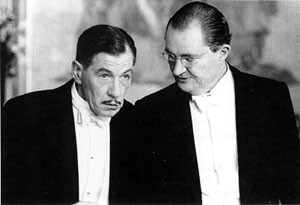
'Nothing that I respect, my gracious Lord.'
Richard's aim is to increase suspicion of the foreigners, Queen
Elizabeth and Rivers, thereby drawing Buckingham, Hastings,
Stanley and the Archbishop into his circle. In this and similar
two-shots, I was able to reduce my height a little, by bending my
knees out of view of the camera. Richard's deformed spine would
have foreshortened his upper body. In long shot, this was not of
course practical: but I like it best when Richard is shorter than
I am.
'I do the wrong. . .' These two lines were
cut in the editing-room, so that the scene now ends with Richard's
confidential glance to camera in reaction to the Archbishop's
piety.
'A virtuous and a Christian-like conclusion . .
.' Rivers was robbed of these lines, in order to introduce the
Archbishop.
In the play, there are three bishops - all
Catholic, one of them a Cardinal. Our Archbishop is head of the
Protestant Established Church and at the centre of the power-
brokers' set, a politician ambitious for the survival and
promotion of his Church.
The Archbishop plays a dangerous game in
encouraging Richmond to take up armed revolt, long before others
decide that Richard has to be dealt with. To look at, butter
wouldn't melt in Roger Hammond's mouth. |
| SCENE
42
INT. CORRIDOR OUTSIDE PRISON BATH-
HOUSE - THE TOWER - NIGHT
TYRELL and the NCO peer through a windowed
door and see their victim at his ablutions in the communal
bath-house.
TYRELL
What! Are you afraid?
NCO
Not to kill him, having a warrant for
it; but to
be damned for killing him, from which no warrant can defend me.
TYRELL
I thought you had been resolute.
NCO
So I am - to let him live.
TYRELL
I'll back to Richard Gloucester and
tell him so.
NCO
No. Stay a little. Some certain dregs
of conscience are yet within me.
TYRELL
Remember our reward, when the deed's
done.
NCO
Phew! He dies. I had forgot the reward.
TYRELL
Where's your conscience now?
NCO
In the Duke of Gloucester's purse. |
scene 42. This truncated version
of one of the few prose scenes is an example of Shakespeare
presenting ordinary citizens caught up in the state affairs of the
principal characters. The NCO's venality is a chilling reminder
that, under tyranny, obeying orders often takes precedence over
doing what is right.
In the play, there are a few other glimpses of the world beyond
the corridors of power. Three citizens discuss politics (2.3) and
in a solo sonnet, the Scrivener confides to the audience his
knowledge of Richard's manipulation of public relations (3.6).
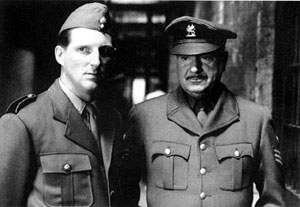
'I had forgot the reward.' Michael Elphick
(NCO) and I met backstage, working at the Chichester Festival
Theatre in 1966. He was a drama student, filling in as a
stage-hand during his long vacation. I was on stage with Laurence
Olivier's National Theatre Company, which used to vacate its home
at the Old Vie Theatre in London to present a summer repertoire in
the Sussex countryside. |
| SCENE
43
INT. PRISON BATH-HOUSE - THE TOWER -
NIGHT
TYRELL and the NCO enter and approach
CLARENCE as he lies in a long, enamelled bath, reading a Bible.
CLARENCE
In God's name, what are you?
NCO
A man as you are.
CLARENCE
But not, as I am, royal.
NCO
Nor you, as we are, loyal.
CLARENCE
Who sent you to me? And why have you
come?
NCO
To ...to...to -
CLARENCE
- murder me!
TYRELL & NCO
Ay, ay.
CLARENCE
But how, my friends, have I offended
you?
NCO
Offended us you have not - but King
Edward.
CLARENCE
I will send you to my brother
Richard,
Who shall reward you better for my life
Than will the King for tidings of my death.
NCO
You are deceived. Your brother Richard
hates you.
CLARENCE
0 no! He loves me and he holds me
dear.
Go you to him, tell him and he will weep.
TYRELL
Yes, millstones! As he lessoned us to
weep.
CLARENCE
0 do not slander him, for he is kind.
TYRELL
Right; as snow in harvest.
The NCO efficiently holds down CLARENCE,
as TYRELL slices open his throat and then pushes the dying man's
head under the water. A rush of red billows through the water
toward the CAMERA. |
'reading a Bible.' At the RNT,
Richard had given his own battle-worn Bible to Clarence to comfort
him in his imprisonment. It foreshadowed Richard playing the holy
man in his duping of the Lord Mayor and city gentlemen. Having
omitted this Bible-business in scene 21,
a newspaper replaces it as Clarence's reading-matter.
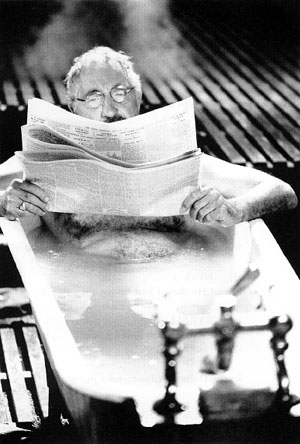
Nigel Hawthorne followed Richard III with more
Shakespeare - playing Malvolio in Trevor Nunn's film of Twelfth
Night.
'0 do not slander him, for he is kind.' To the end,
Clarence is blind to Richard's infidelity. Just as he might begin
to realise the significance of his nightmare about drowning, he is
thrust into the bath water. In the play, the first murderer stabs
Clarence:
Take that and that. If all this will not do.
I'll drown you in the malmsey-butt within. (1.4.268)
|
| SCENE
44
INT. RICHARD'S APARTMENT - THE BARRACKS
- NIGHT
RICHARD, smoking, in his favourite
armchair. He is rubbing his painful, left hand. There is a quiet
knock at the door.
RICHARD
Ratcliffe?
RATCLIFFE enters and hands over a small
packet. RICHARD nods. RATCLIFFE leaves. RICHARD unwraps the
packet, which contains CLARENCE'S cracked spectacles. RICHARD
downs his glass of whisky.
RICHARD ignores his bride, LADY ANNE,
alluringly half- naked in her red lingerie, at their bedroom door.
He checks his Rolex and bustles past her, closing the bedroom door
behind him. LADY ANNE is alone once more. |
scene 44. Richard's
preoccupation with Clarence's death is an appropriate moment to
indicate that his marriage to Lady Anne is already turning sour.
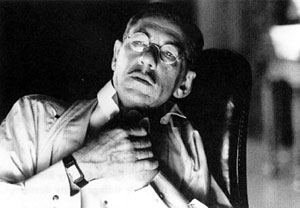
When the final screenplay was issued, it was
called 'the Bible' and almost as much revered, in that every
department took even the most casual of instructions as a rule of
law. For instance, just because 1 had written that Richard wore a
Rolex watch, the property department hired a genuine, vintage
timepiece, worth £5,000, for me to wear onscreen. |
| SCENE
45
EXT. SOUTH-COAST SHORELINE ROAD - DAY
The sun glints on the grey sea of the
Channel and on the gleaming bodywork of RICHARD'S car, preceded by
its escort. Seagulls. |
|
| SCENE
46
INT. RICHARD'S CAR - DAY
RATCLIFFE drives. Behind are RICHARD and
LADY ANNE, she, got up for a royal garden party and looking
perfectly composed, yet perfectly unhappy, in her wide- brimmed
hat. She swallows a couple of tranquillizers with iced water in a
crystal tumbler.
RICHARD, in summer linen and a panama,
ignores her. |
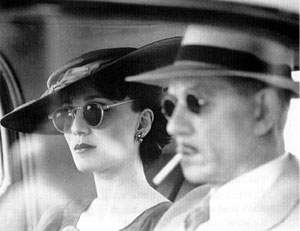
scene 46. Another silent, pictorial presentation of a
barren relationship. Richard and Anne do not speak, not just
because I invented the scene, but because they have nothing to say
to each other. She takes a pill: he an Abdulla. The biggest
surprise when looking at photos and film of the 1930s is the
amount of smoking that was fashionable. The smokers in the film,
apart from Richard, are Lady Anne, Buckingham, Catesby, King
Edward, Queen Elizabeth, the NCO, Ratcliffe, Rivers, Stanley,
Tyrell and as many of the extras who cared to. |
| SCENE
47
EXT. SUMMER HOUSE - COUNTRY RETREAT -
DAY
KING EDWARD and his COURTIERS are hoping a
dose of sea air will halt his physical decline.
The large cast-iron summer-house, looking
out to sea, has every convenience. There are wicker chairs with
comfily padded cushions and tables have the remains of afternoon
tea and cucumber sandwiches.
PRINCE JAMES is playing with his
pedal-car, while his NANNY looks on.
KING EDWARD in his wheelchair is wrapped
in plaid blankets. He is flushed with his efforts to bring old
antagonists into agreement, so as to bolster his wife's powerbase.
Participating are QUEEN ELIZABETH and RIVERS, HASTINGS and
BUCKINGHAM.
KING EDWARD
Why so; now have I done a good day's
work.
Now friends, continue this united league.
Rivers and Hastings, take each other's hand.
RIVERS
Hastings, my soul is purged from
grudging hate.
HASTINGS
Your Majesty, I truly swear the like!
KING EDWARD
Elizabeth, you are not exempt in
this.
Wife, greet Lord Hastings. Let him kiss your hand.
QUEEN ELIZABETH
(graciously proffering her gloved hand to the Prime Minister)
There, Hastings.
HASTINGS kisses the QUEEN'S hand.
KING EDWARD
Now, princely Buckingham,
(laughter)
Make me happy in this unity.
Everyone looks forward with varying
enthusiasm to one of BUCKINGHAM'S elegant speeches.
BUCKINGHAM
(to the QUEEN)
Whenever Buckingham does turn his
hate
Upon Your Majesty, God punish me
With hate from those where I expect most love.
When I have most need to employ a friend, And most assured that he
is a friend -
KING EDWARD
(interrupting, as he sees RICHARD and LADY ANNE approaching)
Richard!
The newly-weds look straight out of Vogue.
LADY ANNE links her arm through RICHARD'S useless one. He needs
his other for the cane. He breaks from his wife and strides
forward to his brother. He bows to the KING and QUEEN.
RICHARD
Good morning to my sovereign King - and
Queen.
KING EDWARD
Now, Richard, we have done a good day's
work:
Made peace of enmity, fair love of hate.
RICHARD
It's death to me to be at enmity:
I hate it and desire all good men's love.
(with absolute commitment; to the QUEEN)
First, Madam, I entreat true peace of
you,
Which I will purchase with my duteous service.
RICHARD goes round the gathering to each
in turn, shaking hands, patting elbows, slapping backs.
RICHARD
(continuing)
Of you, my noble, dear Lord Buckingham,
(smiling broadly)
If ever any grudge were lodged between
us! Of you. Lord Hastings - and you, dear Rivers - "Who, all
without desert, have frowned on me - Indeed, of all!
RICHARD charmingly kisses PRINCESS
ELIZABETH,
who ever-so-slightly recoils. Sycophantic approval all round. LADY
ANNE feels left out.
RICHARD
(continuing; to the King)
I do not know that Englishman
alive,
With whom my soul is any jot at odds
More than the infant that is born tonight.
(aside to CAMERA)
I thank my God, for my humility.
General relief and approval of this
reconciliation.
QUEEN ELIZABETH
I wish to God all strifes were settled
so. My sovereign Lord, I do beseech Your Majesty To bring your
brother Clarence to Your Grace.
RICHARD
Why, Madam, have I offered love for
this?
Who knows not that the gentle Duke is dead?
General consternation and disbelief.
KING EDWARD
'Who knows not he is dead?' Who knows
he is?
Exchange of worried looks.
QUEEN ELIZABETH
All-seeing Heaven, what a world is
this!
KING EDWARD
(continuing; to CATESBY)
Is Clarence dead? The order was
reversed.
CATESBY looks bewildered.
RICHARD
(whispering to KING EDWARD)
But he, poor man, by your first order
died
And that a winged Mercury did bear.
Some tardy cripple bore the countermand.
KING EDWARD
(stammers, beginning a severe asthma attack)
0 God! I fear Thy justice will take
hold
Of me and mine - and mine - and yours for this.
Rivers help me to my bed. 0, poor Clarence.
|
'now have I done a good day's work.'
This is another reference to events which have happened before the
film's story begins. We had to hope that the audience would not
want to enquire into the details of the disagreement which King
Edward has now patched-up into 'this united league'. The main
point is simple - that the King has strengthened his own
power-base, in the hope that it might survive him to support Queen
Elizabeth and the succession of their eldest son.
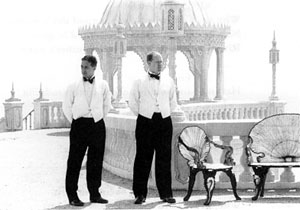
We wanted to show the sickly King Edward recuperating away from
city life. The Esplanade of the De la Warr Pavilion at Bexhill-on-Sea
was designed by Mendelsohn and Chermayeff (l935).
With doctor and nurse in attendance, the royal courtiers have
joined the King as he takes the sunshine - lasting evidence of
England's hottest summer for two centuries. High above the English
Channel, the warm onshore breezes are a little too evident, as
they billow frocks and threaten to blow away wide-brimmed
hats.
This was a difficult location to shoot. The scene had to be
shot rather flatly across a diagonal of 180 degrees to avoid
seeing the hotels and fripperies of modem Bexhill which lay behind
the camera, as it faces out to sea. The cupolas on the terrace
were temporary additions from the art department.
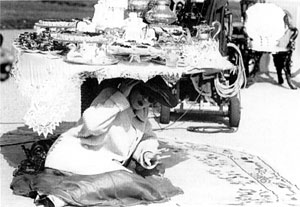
Kristin Scott Thomas sheltering from the wind and
the sun. Only those who bring their own chairs and the actors who
are obligingly provided with them by the props department have
anywhere to sit between filming. Often one's own chair is
occupied.
PRINCESS ELIZABETH. In the play she remains
offstage. Having introduced her into the film, here is an ironic
moment preparing for scene 101, when Richard hopes to marry
her.
'Who knows not that the gentle Duke is dead?'
Here is an odd acting problem - why, if he is upset by Clarence's
death, does Richard allow himself to be so jolly up to this point
in the scene? Perhaps because a courtier is duty-bound to reflect
the monarch's disposition. King Edward is in celebratory mood, so,
therefore, is the ever-polite Richard.
|
| There is near-panic. The NURSE and DOCTOR
take professional control and wheel the ailing KING EDWARD back
towards the house.
QUEEN ELIZABETH, PRINCESS ELIZABETH and RIVERS chase after KING
EDWARD'S wheelchair, up toward the house. |
There is near-panic. Scene 47
ends with a reverse-shot, to complete the other 180 degrees and to
reveal the exterior of Brighton Pavilion, which in reality is
thirty or so miles away along the coast from Bexhill. At the end
of two long nights of filming, for scenes 39,
41, 48, 49,
50, the final shot was just fitted in, as
the early-morning sun lit up the Pavilion's rear elevation. |
|
